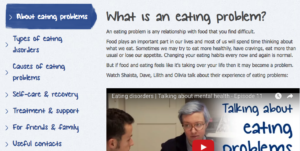 I don’t usually blog about individual Mind booklets and online resources I write or update (you can see the list here).
I don’t usually blog about individual Mind booklets and online resources I write or update (you can see the list here).
But my most recently completed product is pretty close to my heart. It’s called Understanding eating problems.
Changes and updates
I’ve tried to emphasise that you can find eating problems incredibly difficult to live with, without necessarily having a diagnosed eating disorder. I also wanted to make sure it was clear that you can have an eating problem or disorder without being noticeably over or underweight – and that you shouldn’t need a certain BMI or a particular diagnosis to access treatment. It was important to make sure the information was accessible and useful to everyone – including men and older women. These are both groups who are affected by eating problems but often less able to speak about their experiences and access treatment. I also tried to include blogs and quotes from lots of different people, about a range of experiences and problems.
It wanted to talk about the fact that even thinking about recovery can be scary. Eating problems can feel safe – and even exhilarating. Despite an eating problem making your life difficult, you may not feel ready to try and recover straight away. On top of this, I wanted to expand the information we provide on coping with recovery – dealing with food and eating every day in an on and offline world that can seem to spin around eating, food, weight, appearance and body image (you can read more about my own experience here). Sometimes you can look healthier physically, while mentally you’re actually feeling a lot worse. Recovery can take a long time and relapse is common.
The Information Standard
All Mind products are written to the Information Standard. This means that a first draft was reviewed by a number of people with personal and professional experience of eating problems. I love this stage of the writing process as it always gives you new things to think about, and opens my eyes areas I may not have considered or covered properly. We also make sure we consider and respond to all the feedback we receive – I’m looking forward to reading this too (whether it’s positive, negative or suggestions for improvement).
NICE recently updated their guidance around the recognition and treatment of eating disorders. These changes were reflected in the update too.
